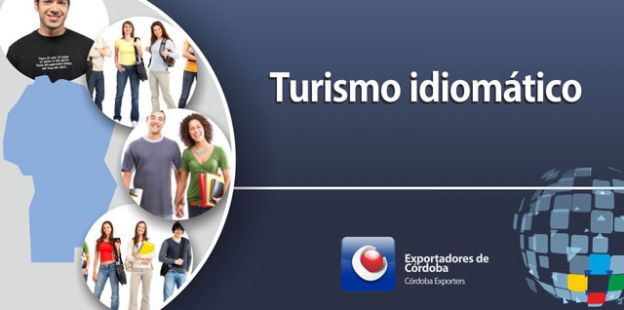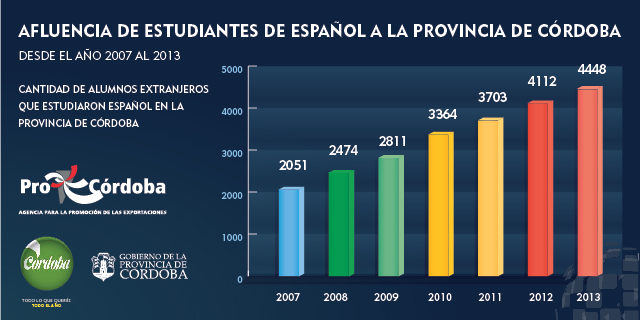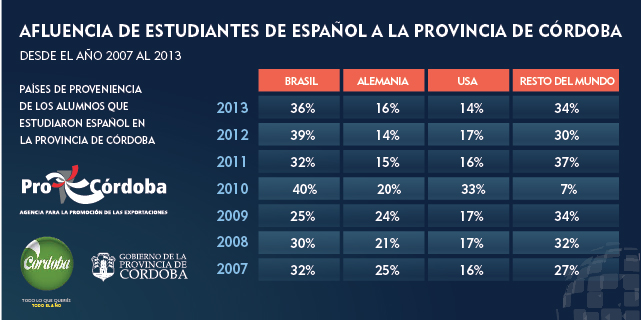
Since the promotion of educational tourism advocated by the Government of the Province of Córdoba together with the institutions and companies, the number of foreign students that study Spanish doubled. Since 2008, ProCórdoba Agency and Córdoba Tourism Agency work together to promote educational tourism.
Below, Darío Ciscar, Coordinator of the Export Groups Program of ProCórdoba Agency and Adrián Bozzoletti, Coordinator of Academic and Linguistic Tourism of Córdoba Tourism Agency, explain the importance of the work between the public and private sector, the growth of linguistic tourism in Córdoba and the importance of academic tourism.
-Which is the work that has been developing jointly with ProCórdoba Agency and Córdoba Tourism Agency to promote academic and linguistic tourism in the Province?
-Adrián Bozzoletti: In 2008, from Córdoba Tourism Agency, together with ProCórdoba Agency, we started working on the proposal for promoting the academic and linguistic tourism. The work in linguistic tourism has antecedents since 2006 and in 2011 we started working on academic tourism. It was very important because exporting services was not usual.
If it is a public issue, in this particular case, together with the private sector, it always has to be evaluated according to the results and the figures show that they are good because the increase in the number of students who have chosen Córdoba to study is relevant. There are records of the students who came to study Spanish to Córdoba from 2007 to 2013 and the number doubled (in 2007, over 2000 students came to study, whereas in 2013, over 4500 students came), so we can say that this is the result of the promotion and the joint work we have done with schools and universities.

For us the balance is very positive because we are still being recognized abroad because of the promotion performed during these years. Today, when we go to Brazil or other important destinations for the sector, they know about Córdoba; we are very well-known and our universities are also very well known.
-Darío Ciscar: This group works with criteria of associativism, which is what ProCórdoba Agency encourages in order for groups of different productive sectors and services at the provincial level to be consolidated, with the conviction that the associativism is a powerful tool that increases the international competence among SMEs.
In the medium and long term, the results of one group are more important than the sum of the companies’ results individually.
- During this process, which are the most important achievements?
- A.B: As regards the offer, we have kept the heterogeneity of the group we have been working with (public and private universities, schools, institutions of Córdoba.) Having a broad world offers a constant improvement and new challenges.
- D.C: Another important aspect is that in this process of internationalization of the educational sector, the organizations have learnt how to show themselves abroad. They know where to go in terms of market strategies. This is the result of the accumulated experience when participating continuously in trade missions, talking with foreign organizations and knowing what they are looking for.
- From this work for the sector of academic and linguistic tourism, how do you consider the synergy between the private and the public sectors and their results?
- A.B: At the beginning, we attended some fairs like Córdoba Tourism Agency, (.not including the private sector). We were asked about the prices of the hotels, etc. and we, as an Agency, do not put a price on anything because we do not sell; we promote academic and linguistic tourism. This is a clear example that without the possibility of being supported by the schools and universities, we would not be able to do more than promoting the destination.
Other thing we have achieved is that it is from the public-private relation that all the actions reach a consensus in meetings. There are no unilateral decisions.
- D.C: Nobody can guarantee the commercial success of the private sector; however, the levels of risks of failure can be decreased. As long as the experience of one sector is accumulated, tight decisions are made and the markets and the strategies to follow are better selected to get the best results.
- D.C: From ProCórdoba Agency, the synergy between the public and private sector could form the ORC Group of Incoming Tourism, made up of ten companies from Córdoba related to tourism. This group started in 2011 and for two years, it had the technical and economic support of the Agency. The ProCórdoba program for the creation of export groups is a tool that we created to rescue and promote the beneficial effects produced by the association for each sector. The results for the companies that make up a group are good not only at the internal level but also at the external one because they strengthen the projection possibilities. This happened with the Group of Incoming Tourism that now continues with its development with the support of ExportAr Foundation and ICBC Foundation.
- A.B: Meanwhile, at the working level we want to be recognized for the joint actions we started and we kept not only Córdoba Tourism Agency but also ProCórdoba Agency to promote the academic and linguistic tourism. In this case, this is the model of work between the public and the private sector.
-Which other aspects favoured the work of trade promotion for that field?
- A.B: In the academic field, at the international level, the history and the landmarks of the National University of Córdoba. They also know that in the Province of Córdoba there is a very good academic level in general. This allows us to have an important advantage. Another key issue is the connectivity that Córdoba has. If this did not exist, it wouldn't be possible. Moreover, the demands and necessities of the sector received attention. All this was necessary.
- Which are the countries that are more interested in the linguistic tourism offer of Córdoba?
- A.B: Brazil is in first place. Then, Germany and USA, countries that are in the second position year after year.
Germany is closer to Spain, and that is a disadvantage in times of competition. But the advantage is that the course is paid in pesos here and they learn other culture.
Mexico is closer to USA, but the social conflictive situation of the country does not attract international students. From these three countries come most of the students of Spanish.

- As regards the academic tourism, which destination is relevant?
- A.B: Colombia is a strategic country in this sense. In this destination we performed joint actions between Córdoba Tourism Agency and ProCórdoba Agency and we signed an agreement in order for the Colombian students to study in our Province. Colombia is an interesting market for our offer of postgraduate courses. In Colombia, education is very expensive and here you can pay the education, rent and food for the same sum of money that there, in Colombia, they pay for education. Moreover, the Colombian Institute for Student Loans and Technical Studies Abroad (ICETEX), is an entity that invest money in order for students to train themselves abroad and then come back to the country. It is like a bank, they receive a credit to pay the M.A but on the condition that they return. The air connectivity we have is also good and this favours the reception of Colombian students in Córdoba.
- Which are the future challenges for the promotion of the academic and linguistic tourism?
- D.C: in the short run, for the event calendar 2015 of commercial promotion, we are working together with the universities and academies in order to respond to your applications.
- A.B: We are also working for segmenting the supply. We know which are the schools and universities but in order to have access to different audiences we have to segment.
- D.C: The internal regulations contribute to this in the groups. In the export groups, the criteria adopted for a specific business in which one can participate and the requisites to enter the group are defined.
- A.B: Taking into account this, another challenge is the company of a convention group among the entities linked to linguistic tourism.
- D.C: The joint labor to deal with future work is a virtuous circle to know which strategy best serves when promoting the sector. We are working together at the governmental level, both agencies together with the private sector. Continuing this job is one of our most important.
Have access to more information about the Consultancy Agency of the export groups offered by ProCórdoba Agency by clicking here

